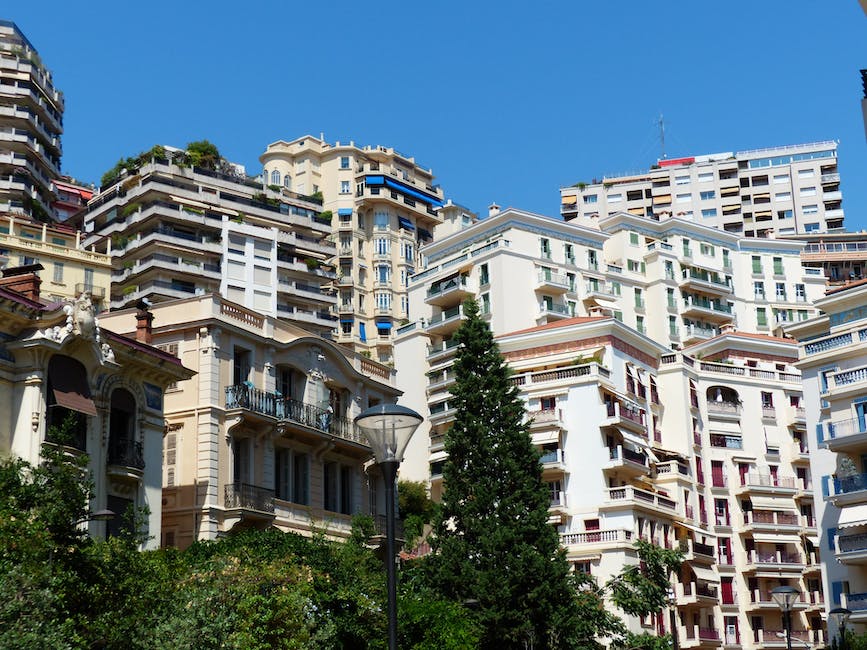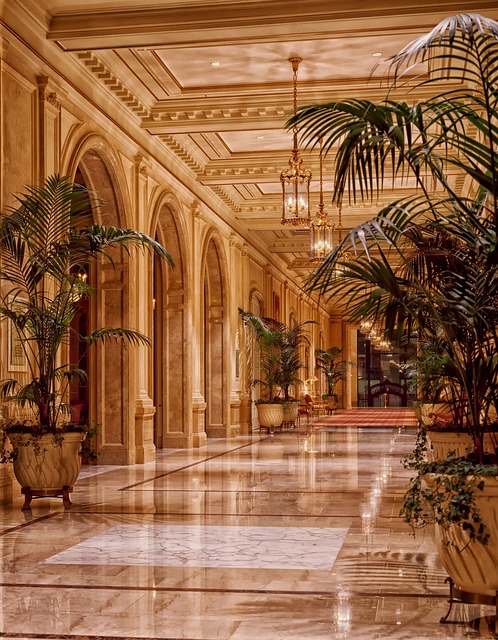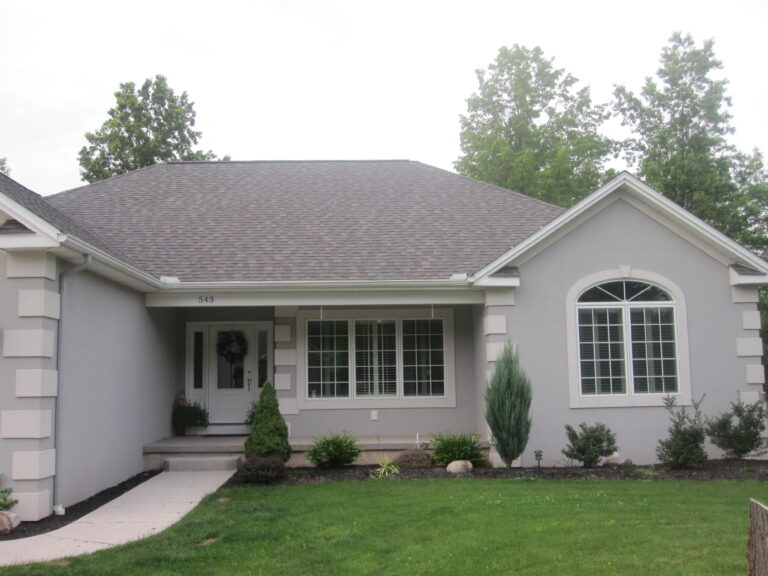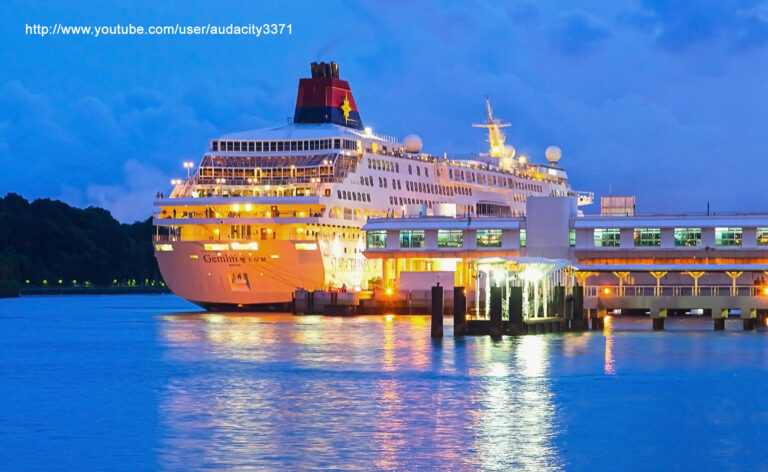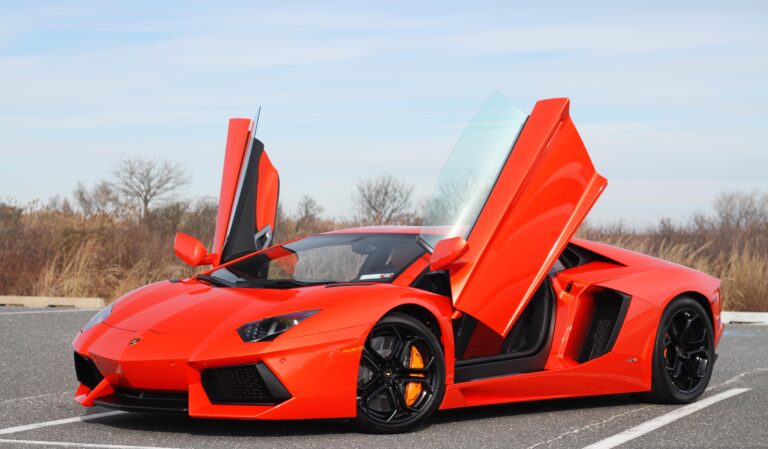What Factors Contribute to the High Cost of Living in Monaco
Monaco, a gem nestled along the picturesque French Riviera, may be small in size, but it carries a colossal reputation for its excessive cost of living. Adorned as the playground for the rich and famous, this tax haven has become an emblem of opulence and extravagance. But have you ever wondered what factors contribute to the absurdly high cost of living in Monaco? Brace yourself, as we unveil the reasons behind this grandiose price tag, sparing no detail or flourish. So tighten your Gucci belts and join us on this enlightening journey to understand the enigma of Monaco’s exorbitant expenses.
Table of Contents
- Why Does Monaco Have One of the Highest Costs of Living in the World?
- The Role of Limited Space and High Demand in Driving Up Prices in Monaco
- Unraveling the Impact of Exclusivity and Luxury on the Cost of Living in Monaco
- Unveiling the Influence of Taxation and Economic Structure on Expenses in Monaco
- Exploring the Expensive Real Estate Market in Monaco: A Key Contributor to High Costs of Living
- Strategies for Mitigating the High Cost of Living in Monaco
- FAQs
- Future Outlook
Why Does Monaco Have One of the Highest Costs of Living in the World?
Monaco, a tiny city-state on the French Riviera, boasts the reputation of having one of the highest costs of living in the world. This prestigious and luxurious destination attracts the elite, celebrities, and the wealthiest individuals from all corners of the globe. But why exactly is living in Monaco so outrageously expensive?
Here are some key factors that contribute to the exorbitant cost of living in Monaco:
- High demand for limited real estate: Monaco’s geographic size is about 2 square kilometers, making it one of the smallest countries in the world. With a limited amount of land available, the demand for housing far surpasses the supply, leading to incredibly high prices for prime property.
- Tax haven for the wealthy: Monaco is well-known for its lenient tax policies. The lack of personal income tax and low corporate tax rates make it an attractive destination for high-net-worth individuals and businesses. As a result, the influx of money and wealth further drives up the overall cost of living.
- Luxury lifestyle and impeccable services: Monaco is synonymous with opulence, offering a wide array of luxury goods and services to its affluent residents. From high-end fashion boutiques to five-star hotels and Michelin-starred restaurants, everything comes at a premium price.
Living in Monaco comes with a hefty price tag, but for those who can afford it, the city-state offers a unique blend of luxury, safety, and breathtaking views that are hard to find elsewhere. The allure of this glamorous destination, combined with its advantageous tax system, contributes to its status as one of the most expensive places to live in the world.
The Role of Limited Space and High Demand in Driving Up Prices in Monaco
In the glamorous city of Monaco, limited space and high demand have become two critical factors that contribute to skyrocketing prices. This small principality nestled on the French Riviera has gained a reputation for its luxurious lifestyle, prestigious events, and stunning waterfront views. However, with such a small land area of just 2.02 square kilometers, Monaco is caught in a constant battle to accommodate the ever-increasing number of people wanting to live, work, and play in this exclusive haven.
The scarcity of land in Monaco has resulted in a premium being placed on every inch of available space. As a result, property prices have surged to astronomical levels, making it one of the most expensive real estate markets in the world. The high demand to own a piece of this opulent paradise, combined with a limited supply, has created a fiercely competitive market where prices continue to soar. Whether it’s a lavish penthouse overlooking the Mediterranean or a chic apartment in the heart of Monte Carlo, the allure of Monaco’s limited space has undoubtedly played a significant role in driving up prices.
Unraveling the Impact of Exclusivity and Luxury on the Cost of Living in Monaco
Monaco: a playground of exclusivity, opulence, and luxury that often leaves people wondering about its impact on the cost of living. Step into this captivating oasis, where every facet of life is infused with unparalleled extravagance, and get ready to unravel the connection between exclusivity, luxury, and living expenses.
In Monaco, exclusivity reigns supreme, as this breathtaking principality is renowned for its remarkable ability to attract the crème de la crème of society. The allure of living among the world’s elite comes with a price tag, and that is reflected in the cost of housing. Luxurious apartments and expansive villas lining the stunning coastline command premium prices, catering to those who seek the epitome of refinement and comfort. The scarcity of land in this petite paradise further fuels the demand, driving property prices to astronomical heights. Additionally, the exclusivity extends to the rental market, where high-end flats and lavish villas are always in vogue, leading to steep monthly payments that can truly leave a dent in one’s wallet.
However, living in Monaco is not solely defined by lavish residences. Exquisite dining experiences abound in this gastronomic haven, where Michelin-star restaurants and world-class chefs showcase their culinary prowess. Indulging in these gastronomic delights can be an expensive affair, where leading-edge cuisine becomes an art form that leaves a lasting imprint on taste buds and bank accounts. For those seeking a retail therapy escape, Monaco presents a wealth of high-end boutiques and designer stores. From luxury fashion houses to exclusive jewelry brands, every shopping excursion in the principality hints at elegance and precision, amplifying the notion that living in Monaco embraces the epitome of luxury. With some of the most renowned brands dotting the streets, the cost of indulging in haute couture and exquisite accessories can quickly soar to new heights.
Embark on a journey to Monaco – a place where exclusivity and luxury rule the day, but be prepared to navigate through a world where the cost of living aligns with the high standards it encompasses. Whether adorning the walls of your opulent abode or pampering your taste buds with delicacies fit for kings, the association between exclusivity, luxury, and the cost of living in Monaco remains an intricate tapestry interwoven with unparalleled magnificence.
Unveiling the Influence of Taxation and Economic Structure on Expenses in Monaco
Monaco, renowned for its glitz and glamour, is not only a haven for the wealthy but also a fascinating case study for examining the impact of taxation and economic structure on expenses. With its reputation as a tax haven, it’s no surprise that taxation plays a significant role in shaping the cost of living in this small principality. However, there are other crucial factors at play that contribute to the overall expenses experienced by residents and visitors alike. Let’s delve into the various elements and understand how they interconnect.
Taxation: In Monaco, the absence of income tax for residents has long been a draw for international high-net-worth individuals seeking refuge from hefty tax burdens. Alongside this, the principality also offers advantageous tax rates for businesses, making it an attractive location for companies to establish their presence. While this favorable tax framework may initially seem like a straightforward benefit, it also influences other aspects of expenses, such as the cost of goods and services, employment opportunities, and the availability of affordable housing.
- Economic Structure: Monaco’s economy thrives on tourism, banking, and finance industries. The presence of a strong financial sector not only contributes to the nation’s GDP but also impacts the overall expenses. For instance, the demand for luxury accommodations and high-end goods drives prices higher, making it pricier for both residents and visitors to sustain their lifestyles. Additionally, the concentration of wealth in these sectors further reinforces the influence of taxation on expenses, as businesses and individuals navigate the intricacies of profit margins and spending patterns.
- Cost of Living: Monaco’s reputation as an affluent playground often overshadows the challenges faced by those with more modest means. The absence of income tax for residents may seem enticing; however, the high costs associated with housing, dining, and leisure activities offset this apparent advantage. Moreover, the reliance on imported goods and limited space, coupled with the impact of high demand, contribute to inflated prices. These factors paint a more nuanced picture of the expenses in Monaco, highlighting the intricate relationship between taxation, economic structure, and the cost of living.
provides a deeper understanding of this glamorous enclave’s dynamics. Beyond its surface allure, this small principality offers a captivating lesson in how various factors intertwine to shape the financial realities experienced by its residents and visitors. By examining these elements, we can gain valuable insights into the complexities of taxation and economic structure and their impact on expenses in a unique setting like Monaco.

Exploring the Expensive Real Estate Market in Monaco: A Key Contributor to High Costs of Living
Monaco, known for its glitz and glamour, also boasts one of the most expensive real estate markets in the world. The luxurious properties in this tiny principality contribute significantly to the high costs of living experienced by its residents. Let’s delve into the factors that make Monaco’s real estate so exorbitant.
1. Limited space: With an area of just 2.02 square kilometers, Monaco suffers from a scarcity of land. Its highly desirable location on the French Riviera means that demand for real estate outweighs supply, leading to skyrocketing prices.
2. Prestige and exclusivity: Monaco has long been associated with luxury, attracting the global elite. The allure of rubbing shoulders with billionaires, celebrities, and royalty drives up the value of properties in this exclusive enclave.
In addition to these factors, Monaco’s real estate market benefits from favorable tax policies, strong demand from international buyers, and a booming tourism industry. It comes as no surprise that the quest to secure a slice of this prestigious paradise comes with a steep price tag. Monaco’s high costs of living are, in large part, fueled by its expensive real estate market which continues to thrive amidst the glimmering backdrop of opulence.
Strategies for Mitigating the High Cost of Living in Monaco
Monaco is notorious for its high cost of living, but fear not, as there are several effective strategies to help you mitigate these expenses and live comfortably in this lavish city-state.
1. Housing Alternatives: Instead of diving headfirst into the real estate market, consider exploring more affordable options such as renting a smaller apartment or sharing a living space with roommates. Additionally, peripheral areas near Monaco could provide cheaper accommodation options while still keeping you within reach of all the city has to offer.
2. Budgeting and Prioritizing: Creating a comprehensive budget is essential to ensure your expenses don’t spiral out of control. Prioritize your spending by cutting back on non-essential items and focusing on the things that truly matter to you. By carefully allocating your financial resources, you can strike a balance between enjoying the luxurious lifestyle Monaco offers and staying within your means.
3. Exploring Local Markets: Monaco may be known for its upscale shopping scene, but that doesn’t mean you can’t find bargains. Take advantage of the multitude of local markets, such as the Condamine Market, where you can find fresh produce, seafood, and local specialties at more reasonable prices. Incorporating these markets into your shopping routine can help reduce your overall food expenses.
4. Public Transportation and Cycling: Monaco’s compact size and well-connected public transportation system make it easy to get around without the need for a car. Opt for a monthly or weekly pass that suits your needs and take advantage of buses and trains for your daily commute or weekend adventures. Cycling is also an excellent way to navigate the city and enjoy the stunning Mediterranean scenery while being cost-effective and eco-friendly.
By implementing these strategies, you can make the most of your time in Monaco while ensuring your finances remain intact. Embrace the charm of this glamorous destination without letting the high cost of living dampen your spirits.
FAQs
1. What factors contribute to the high cost of living in Monaco?
The high cost of living in Monaco can be attributed to several factors:
- Limited Land Area: Monaco is a tiny sovereign city-state located on the French Riviera, with a land area of just 2.02 square kilometers. This limited space has led to high demand for real estate, driving up property prices significantly.
- Exclusivity and Prestige: Monaco is known for its luxurious lifestyle and prestigious reputation. Many wealthy individuals and celebrities choose to live in Monaco due to its favorable tax policies, security, and upscale amenities. The exclusivity of the location contributes to higher demand and subsequently higher prices.
- Tax Benefits: Monaco offers various tax incentives for residents, including no personal income tax and low business taxes. This attracts high-net-worth individuals and businesses, further increasing demand for limited resources and driving up costs.
- Tourism and Entertainment: Monaco is a popular tourist destination, attracting visitors from around the world to its casinos, yacht shows, Formula 1 Grand Prix, and other high-profile events. This influx of tourists and the need to maintain a luxurious atmosphere contribute to the high cost of services, accommodation, and entertainment.
- Limited Natural Resources: Due to its small size, Monaco has limited space for agriculture or resource extraction. This means that a significant portion of its goods, including food and resources, need to be imported, which can drive up costs.
- Real Estate Demand: The demand for real estate in Monaco far outweighs the supply. The presence of wealthy individuals seeking exclusive properties and the limited land availability lead to skyrocketing property prices.
- High Demand for Skilled Labor: The need to maintain a high standard of living and cater to the wealthy residents and visitors requires a skilled workforce. The demand for skilled professionals, combined with the high living costs, leads to higher wages and subsequently higher prices for goods and services.
- Transportation Costs: Monaco’s location along the Mediterranean coast makes it a prime location for yacht owners and enthusiasts. The cost of maintaining and operating yachts, as well as the need for high-end transportation options, can contribute to the overall high cost of living.
- Currency Exchange Rates: Monaco uses the Euro (€) as its official currency. Fluctuations in exchange rates can impact the purchasing power of residents and visitors, affecting the overall cost of living.
In summary, the combination of limited space, luxury lifestyle, tax incentives, tourism, high demand for resources, and a prestigious reputation all contribute to the high cost of living in Monaco. It’s a destination known for catering to the ultra-wealthy and maintaining a level of luxury that comes with a premium price tag.
2. Why is Monaco expensive?
Monaco’s high cost of living is primarily driven by its extremely limited land availability and high demand for luxury properties. The city-state covers a mere 2 square kilometers, resulting in sky-high real estate prices. Additionally, Monaco’s reputation as a tax haven attracts wealthy individuals, further increasing the demand for exclusivity and luxury.
3. Is housing the main cost driver?
Yes, housing is a significant cost driver in Monaco. The scarcity of available land combined with strong demand from the affluent population leads to exorbitant property prices and sky-high rents. Whether you’re looking to buy or rent, be prepared to dig deep into your pockets.
4. What about expenses other than housing?
In addition to housing, other expenses in Monaco also contribute to its high cost of living. The city-state imposes no income tax for residents, but the cost of essential goods and services is considerably higher than in many other countries. From groceries to dining out, expect to pay a premium for everyday necessities.
5. Are there any tax benefits that offset the high cost of living?
While Monaco is renowned for its favorable tax policies, including no income tax, it’s important to note that these benefits are primarily enjoyed by high-income individuals. For the average resident, the savings from tax breaks might not sufficiently offset the overall high cost of living.
6. Are there any factors contributing to the high cost of living beyond housing and taxes?
Yes, there are several additional factors contributing to the high cost of living in Monaco. The city-state boasts a luxurious lifestyle with top-notch amenities, high-end shops, and world-class entertainment, all of which come at a premium. Additionally, Monaco’s limited size necessitates importing a large portion of goods, leading to higher transportation and import costs.
7. Are there any benefits to living in Monaco despite the high cost?
Absolutely! Monaco offers a secure, glamorous, and cosmopolitan environment that appeals to many. The city-state boasts a high standard of living with excellent healthcare, safety, and infrastructure. Furthermore, the Mediterranean climate and stunning scenery add to its allure. If you can afford it, living in Monaco can be a truly luxurious experience.
In summary, the high cost of living in Monaco stems from factors such as limited land availability, high demand for luxury properties, expensive goods and services, and the allure of tax benefits for high-income individuals. While it may come with a hefty price tag, living in Monaco comes with a unique and luxurious lifestyle that is unmatched elsewhere.
Wrapping Up
In conclusion, the high cost of living in Monaco can be attributed to several key factors. Firstly, the limited land availability forces residents and businesses to compete for space, driving up prices exponentially. Secondly, the principality’s favorable tax status and attractive investment opportunities attract wealthy individuals and corporations, increasing the demand for luxury goods and services. Additionally, Monaco’s high standard of living, comprehensive social benefits, and excellent infrastructure contribute to the overall high cost of living. While the breathtaking surroundings and glamorous lifestyle may be enticing, it is important to consider these factors before making the decision to reside in this exclusive Mediterranean paradise. However, despite the steep expenses, Monaco certainly offers an unparalleled quality of life for those who can afford it.

